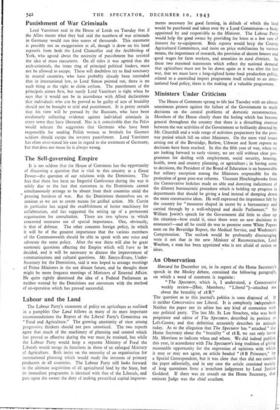Ministers . •Under Criticism
The House of Commons sprang to life last Tuesday with an almost unanimous protest against the failure of the Government to reach decisions on • the central problems of domestic reconstruction. Members of the House clearly share the feeling which has become general throughout the country that there is a disturbing contrast between the war activities of the Government so brilliantly directed by Mr. Churchill and a wide range of activities preparatory for the post- war period which fall on other Ministers. On the most vital issues arising out of the Beveridge, Barlow, Uthwatt and Scott reports no decisions •have been reached. In this the fifth year of war, when we are looking forward to early victory, we are still without clear pro- grammes for dealing with employment, social security, housing, health, town and country planning, or agriculture ; in having come to decisions, the President of the Board of Education is an honourable but solitary exception among the Ministers responsible for the projection of great post-war reforms. Viscount Hinchingbrooke from the Conservative betiches made an able and damning indictment of the dilatory bureaucratic procedure which is holding up progress in departments that should be giving a lead instead of damping down the more constructive ideas. He well expressed the impatience felt by the country for "measures shaped in secret by a bureaucracy and carried through by a well-whipped and docile Parliament." Sir William Jowitt's speech for the Government did little to clear up the situation—how could it, since there were no new decisions to announce?—and all he could do was to promise some White Papers
soon on the Beveridge Report, the Medical Service, and Workmen's Compensation. The outlook would be profoundly discouraging were it not that in the new Minister of Reconstruction, Lord -Woolton, a man has been appointed who is not afraid of action or ideas.


























 Previous page
Previous page